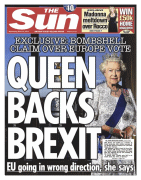Boston GlobeBy John R. BoltonApril 19, 2016Americans generally still see the EU as an economic union. Until relatively recently, many still called it “the Common Market,” though Europeans themselves had long ago discarded that outmoded term. In economic theory, a continental free-trade zone is hard to argue against; indeed, its commercial appeal was what initially persuaded the UK and others to join. But the EU is not now, hasn’t been for years, and for many never was, intended to be “merely” a free-trade area.
Instead, from its inception, the EU [and predecessors like the European Coal and Steel Community] was always primarily about reconfiguring political power. EU acolytes believe that the very concept of the nation-state brought war and misery to Europe for centuries. Their answer was straightforward: Eliminate European nation-states, a goal embodied in the 1957 Treaty of Rome’s pledge of “ever closer union.” Although Brits generally understood this phrase as merely aspirational, it was gospel for the EU’s altar boys.
Brexit, therefore, highlights for America a central issue in the international sphere: “Who governs?” [As the title of Robert Dahl’s classic study asked.] Today, the United States stands on the slippery slope of “sovereignty sharing,” a concept central to what its EU devotees call “the European project.” At the turn of the millennium, the consensus in academia held that the global nature of so many problems [climate change, for example] meant it was only a matter of time before national sovereignty would be relegated to museums. Although this supranational euphoria has subsided somewhat, Britain’s referendum would constitute a true counterrevolution.
Americans, therefore, should hardly be surprised so many Britons resent distant and unaccountable EU governance. On this side of the Atlantic, we readily understand that sovereignty resides constitutionally in “we, the people,” not in the federal government. At a time of dwindling confidence that we have control over our own government, the idea of sharing sovereignty internationally, thereby diluting it even further, is decidedly as unattractive here as in Britain.
Britain’s debate is full of specious charges and countercharges, such as the argument that Brexit would endanger British and European security. This is false. Europe’s security rests with NATO, not the EU, and NATO has one thing the EU never will: the United States. Nor will Britain simply be cast adrift if it leaves the EU. Economic common sense will persuade all concerned to mitigate the consequences of the split and maintain the benefits of free economic intercourse. If European states, upset with Brexit, try “beggar thy neighbor” policies in response, they will deserve what they get.
 What I learned living in the UK for three years is that two things were not to ever be understood by yours truly – British Politics and Cricket.
What I learned living in the UK for three years is that two things were not to ever be understood by yours truly – British Politics and Cricket.  And since I was there, they’ve added the European Union to the mix, so now I double-dog don’t understand. So Obama is headed to London, and he wants the UK to stay in the EU whereas John Bolton, despised by me from his Bush UN Ambassador days as a noted neoconservative opposed to the UN, is fanning Brexit [BRitish EXIT] flames on the side of the Queen. Who can sort this out? Well, the British people will soon have the chance to vote. The "INs" are in the lead, but the polls have gone back and forth.
And since I was there, they’ve added the European Union to the mix, so now I double-dog don’t understand. So Obama is headed to London, and he wants the UK to stay in the EU whereas John Bolton, despised by me from his Bush UN Ambassador days as a noted neoconservative opposed to the UN, is fanning Brexit [BRitish EXIT] flames on the side of the Queen. Who can sort this out? Well, the British people will soon have the chance to vote. The "INs" are in the lead, but the polls have gone back and forth.
1bom, If you are looking for coverage that speaks to the pro-TTIP end of the spectrum you might try googling “politico” along with any of your current searches. E.g. http://www.politico.eu/article/the-case-for-ttip/
NOT saying it’s a good idea. But it might make for good supplemental reading.
I would also concur that anti-TTIP sentiment makes for interesting bed fellows. Isn’t Trump negative about TTIP?
And now for something completely different…
http://www.ncbi.nlm.nih.gov/m/pubmed/26935187/
Hmmm…